Let me take you back to my high school days. I was walking up the main staircase and it was TORTURE. My whole body was wrecked by a new, extra slow, adagio my dance teacher had put us through the night before.
Did I suffer quietly? Absolutely not. I bragged to my boyfriend, my best friend, later on at track practice. I bragged to anyone who was around about how sore I was from dance.
Because, obviously, if I was sore it meant that my workout was really excellent and challenging. Right? In fact, the football team never complained about being sore, so obviously dance was even harder.
I was an elitist about being sore. Where I grew up dancing, being sore was a badge of honor; an indicator that you were working your hardest. The harder you worked, the more sore you’ll be- simple.
Now imagine my surprise when, as an adult and professional dancer I started to learn that soreness might not actually indicate hypertrophy (muscle growth). And on top of that, you can work incredibly hard and not be sore.
I couldn’t believe it. So I took to google:
“Should I be sore after every workout?”
The results were surprising.
According to the National Library of Medicine, muscle soreness does not necessarily equal muscle growth.
DOMS (Delayed Onset Muscle Soreness) occures when muscles are damaged or inflamed. This can happen any time you do a new activity; whether that’s changing up your workout or taking a new style of dance class. That doesn’t necessarily mean you are building those muscles, just that they haven’t been used in that way for awhile or ever.
Now you may be asking, what about weightlifting and cross training. Should I be sore every every workout?
The short answer is no.
When you’re weightlifting, for example, you are training your body over time to handle a ceratin level of load. Once that becomes easy and you move up in weight, that likely won’t yield a large amount of soreness.
Bottom line? If you are increasing weights appropriately as you train, DOMS shouldn’t hold you back too much.
The odds of experiencing intense levels of DOMS decreases even further if you fuel yourself. If you are consuming an adequate level of protein for your activity level, studies show that increasing your carbohydrate intake can help prevent DOMS when leveling up your workouts.
That’s right. Carbohydrates will actually help your body recover faster between workouts.
So, to the question, should I be sore after every workout?
Not if you are fueling yourself well and increasing your workout intensity appropriately.
In fact, despite all of us wanting to be sore after we work out, DOMS (as many of us have experienced first hand) can affect your athletic performance negatively.
Decreased range of motion and decreased shock attenuation (how we land our jumps and absorb shock) occur when experiencing DOMS. As well as alterations in muscle sequencing and recruitment- which leads to excess stress being placed on other muscle ligaments and tendons.
And yes, you guessed it, that’s when muscle fatigue can lead to potential injury or strain.
Should you experience DOMS in an intense way, you should reduce the level of intensity of your workouts for 1-2 days.
However, you should DEFINITELY continue to work out as working out is the best way to alleviate the pain experienced by DOMS.
Additionally, should you experience DOMS it’s important to know that, according to studies, stretching does not make a uge impact on soreness.
Instead you should focus on recovery techniques.
Luckily Dancers Who Lift has an entire blog dedicated to promoting faster recovery. You can give it a read, right here.
That way, next time you find yourself asking, “should I be sore after every workout?” You can go through your recovery checklist.
Odds are, if you are fueling yourself and using these methods of recovery, you won’t be sore after every workout.
What’s better, the faster you recover the more progress you can make!
So quit measuring the success of your workout by whether or not you’re sore.
Instead measure the success of your workout by whether or not you showed up, how well fueled you were, your energy level, and whether or not you were challenging yourself.
Those are much better tools of evaluation and are sure to help you and your coach make a game plan for achieving your goals!


